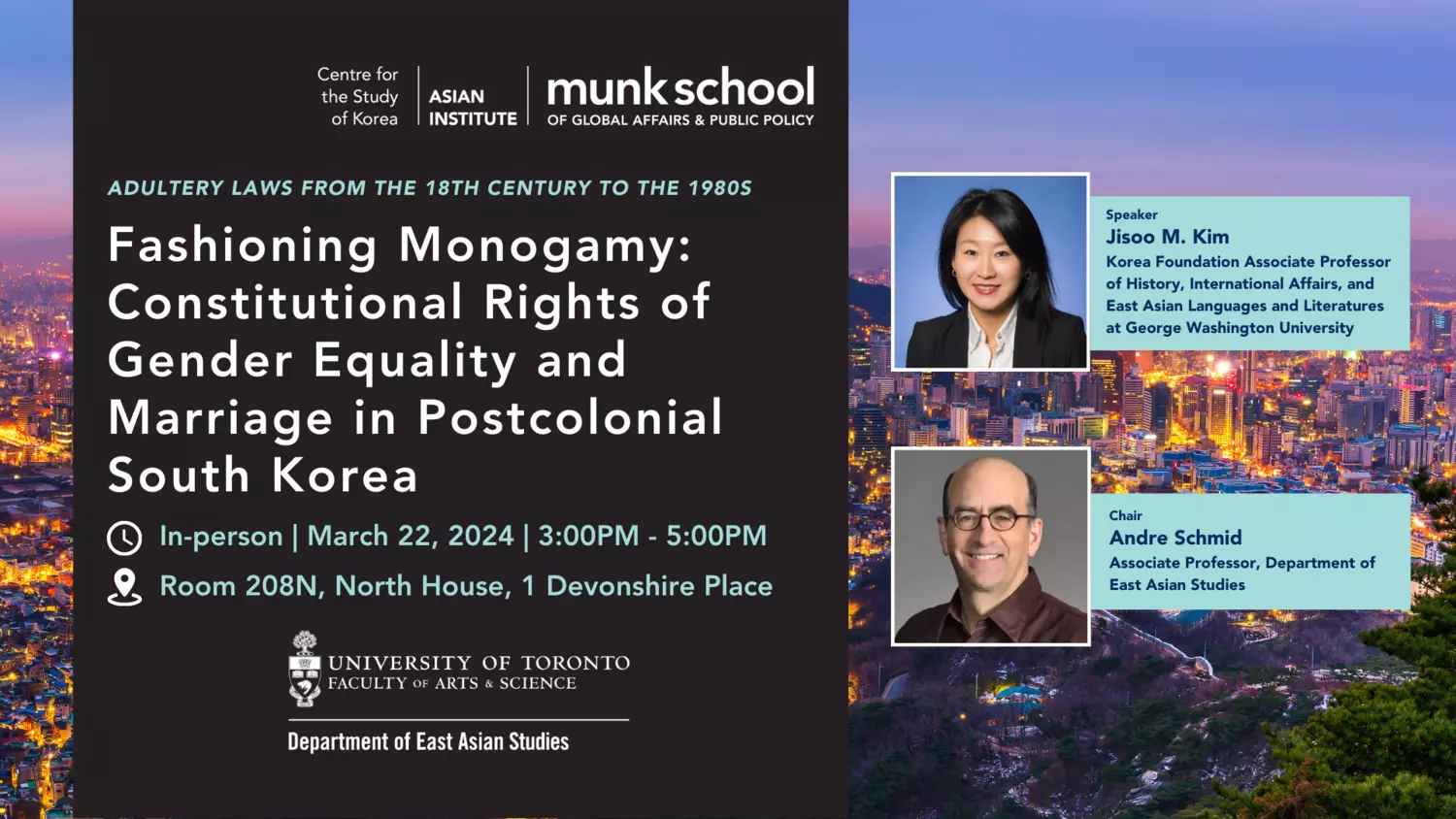
Adultery Laws From the 18th Century to the 1980s
March 22, 2024 | 3:00PM - 5:00PM
|
In-person
This event took place in-person at Room 208N, North House, 1 Devonshire Place, Toronto, ON, M5S 3K7
ABOUT THE TALK
Fashioning Monogamy: Constitutional Rights of Gender Equality and Marriage in Postcolonial South Korea
In postcolonial South Korea, one of the areas that the state prioritized in the nation-building process was to construct modern monogamous marriage (ilbuilch’ŏ) based on gender equality. Article 20 of the Founding Constitution stipulates, “Marriages shall be based on the equality of men and women. Purity in marriage and the family’s health shall be under the special protection of the state.” By constitutionalizing “purity in marriage,” the state banned the old customary practice of concubinage that existed for centuries in Korea. Article 20 of the Founding Constitution was later instrumental in passing the gender-neutral adultery law at the National Assembly in 1953. This new gender-neutral adultery law penalized men’s concubinage practices and their extramarital affairs for the first time in Korean history. By examining Article 20 of the Founding Constitution and the legislation of the adultery law during the Syngman Rhee period, this presentation demonstrated how the constitutional language of gender equality in marriage played a critical role in establishing modern monogamous marriage and criminalized the long customary practice of concubinage in postcolonial South Korea.
ABOUT THE SPEAKERS
Jisoo M. Kim is the Korea Foundation Associate Professor of History, International Affairs, and East Asian Languages and Literatures at George Washington University. She is Founding Director of the GW Institute for Korean Studies (2017-Present) and Founding Co-Director of the East Asia National Resource Center (2018-Present). She also serves as Editor-in-Chief of the Journal of Korean Studies. She specializes in gender, sexuality, law, emotions, and affect in Korean history. She is the author of The Emotions of Justice: Gender, Status, and Legal Performance in Chosŏn Korea (University of Washington Press, 2016), which was awarded the 2017 James Palais Prize of the Association for Asian Studies. She is also the co-editor of The Great East Asian War and the Birth of the Korean Nation by JaHyun Kim Haboush (Columbia University Press, 2016). She is currently working on a book project tentatively entitled Criminalizing Intimacy: Marriage, Concubinage, and Adultery Law in Korea, 1469-2015. She received her M.A., M.Phil., and Ph.D. in East Asian Languages and Cultures from Columbia University.
(Chair) Andre Schmid is an Associate Professor at the Department of East Asian Studies, University of Toronto. Schmid's research and teaching focus on 19th and 20th century Korea and East Asia, as seen in the broader context of global, comparative history. He is currently working on a book about the early formation of North Korea after the devastation of the late colonial and Korean wars. This book focuses on the turn to the heteronormative nuclear family by both the population and the Party-state as a primary site for postwar reconstruction and decolonization. In this gendered, socio-economic history of north Korean urban families, he examines how issues such as advice literature, apartment construction, divorce, and consumption established norms that while explicitly revolutionary often enabled, implicitly, a conservative politics that has always remained at the core of North Korean political culture.
Sponsor: Centre for the Study of Korea, Asian Institute
Co-Sponsor: Department of East Asian Studies, University of Toronto